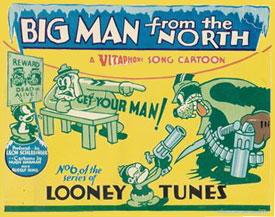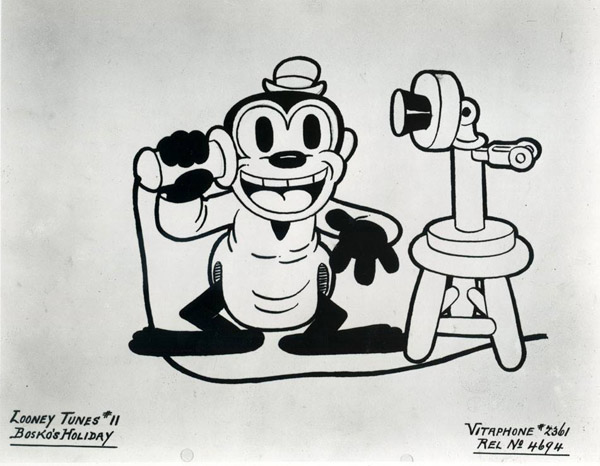The 1930-31 movie season – yes, movies had a season similar to what television would later have – was very good to Warner Brothers Pictures. That season, they discovered the money that could be made in putting out violent gangster pictures. Also, that season’s Looney Tunes were doing respectably well in the marketplace. They continued to plug Warner songs from their publishing companies.
 Big Man From the North (1/9/31) – This cartoon, set in the frozen North, pits Bosko, now a mountie, against a hulking villain possessed of a peg-leg. I leave it to others to determine how close this villain came to Peg Leg (Black) Pete. When Bosko gets to the saloon where all the action takes place, Honey is busy scatting to “Chinnin’ and Chattin’ With May” (previously heard in Box Car Blues). Bosko at one point plays, “The Man From the South”, a song that had its popularity about a year before the release of this cartoon. Popular versions of this song included versions by Ted Weems (Victor), and Rube Bloom and His Bayou Boys (Columbia) featuring a 21 year old Benny Goodman, and it was also covered by most other record companies, big and small.
Big Man From the North (1/9/31) – This cartoon, set in the frozen North, pits Bosko, now a mountie, against a hulking villain possessed of a peg-leg. I leave it to others to determine how close this villain came to Peg Leg (Black) Pete. When Bosko gets to the saloon where all the action takes place, Honey is busy scatting to “Chinnin’ and Chattin’ With May” (previously heard in Box Car Blues). Bosko at one point plays, “The Man From the South”, a song that had its popularity about a year before the release of this cartoon. Popular versions of this song included versions by Ted Weems (Victor), and Rube Bloom and His Bayou Boys (Columbia) featuring a 21 year old Benny Goodman, and it was also covered by most other record companies, big and small.
Also heard, “Looking for the Lovelight In the Dark”, performed on Victor Records by Jackie Taylor and his Orchestra (Victor 22501-B). Here it is from Warner’s feature Top Speed (1930):
Ain’t Nature Grand? (3/14/31) – Bosko cavorts with nature, and is ultimately pursued by insects. Early in this cartoon, we hear snatches of “Piccolo Pete” (recorded by Ted Weems for Victor, the Six Jumping Jacks (Brunswick), Vincent Lopez (Grey Gull), and Harry Reser’s Syncopators (Columbia), among others); “Telling It To the Daisies” (dance versions by Bernie Cummins (Victor), Ted Wallace and His Campus Boys (Columbia), and vocals by Lee Morse (Columbia) and a few others); And “Don’t Tell Her (What’s Happened to Me)”, one of those good DeSylva, Brown, and Henderson songs (recorded by Nat Shilkret (Victor) and vocal versions by Ruth Etting (Columbia) and Talulah Bankhead on HMV in England). A full chorus of “The Kiss Waltz” also appears (recorded by George Olsen (Victor), Ben Selvin (Columbia), and numerous others), later used to advantage as a skating specialty in Tex Avery’s Land of the Midnight Fun (1939). Here it is sung by Sue Carol in Warner Bros. Dancing Sweeties (1930):
Ups ‘n’ Downs (4/26/31) [Link] – Bosko gets involved with using a mechanical horse in a horse race. The title appears to be suggested by the name of a famous racetrack in Louisville, KY. Songs include “Lady Luck”, another plug song from Warner’s The Show of Shows (1929), which had been recorded by Johnny Hamp’s Kentucky Serenaders (Victor), Ted Lewis (who sang it in the original picture) on Columbia, and also as a vocal by Chick Endor (Victor).
Dumb Patrol (5/30/31) – Bosko in a WWI aerial battle. [Link]. Songs include “Quand Madelon”, a genuine WWI march, which was picked up by American soldiers from the French, given an English lyric and a subtitle (“I’ll Be True To the Whole Regiment”), recorded when it was fresh by the Victor Military Band with a vocal in French, believed by some to be the operatic basso Marcel Journet. Also featured in the soundtrack is a snatch of “Nine Little Miles From Ten-Ten-Tennessee”, best known from a Victor recording by Duke Ellington and his Orchestra with vocal by Smith Ballew, whose own orchestra recorded it for Columbia. Also, a snatch of “When Love Comes In the Moonlight, which was recorded for the American Record Company’s dime-store labels by Adrian Schubert and his Orchestra.
Yodeling Yokels (6/13/31) – Bosko in the Alps, with quite a bit of space taken up by a mouse trying to play miniature golf, using a stick of macaroni, a pea, and a wedge of Swiss cheese. [Link]. Songs include “I Miss My Swiss”, a 1925 hit recorded by the Happiness Boys (Billy Jones and Ernest Hare) for Columbia and Victor, and as a dance record by Paul Whiteman (Victor), the California Ramblers (Banner), and a group called the Southern Serenaders (Harmony) with a meeting of members of both Sam Lanin’‘s and Fletcher Henderson’s orchestras, including a young Louis Armstrong! Other pieces heard in snatches include “Maybe It’s Love” (cut by such bands as Leo Resiman (Victor) and the Hit of The Week Orchestra on a laminated cardboard record), and “Laughing at Life” (recorded by McKinney’s Cotton Pickers (Victor) and Ted Lewis (Columbia – featuring trombone solo by Jack Teagarden, who has a history in cartoons discussed in one of my previous articles).

Bosko’s Holiday (7/18/31) – At the beginning of the cartoon, we hear, “I Can’t Give You Anything But Love”, which had been introduced in Lew Leslie’s “Blackbirds of 1928″, and which became an often-recorded standard, favored by jazz musicians everywhere, especially by Louis Armstrong. Also heard, toward the end when Bosko and and Honey get to their picnic spot, “Tie a Little String Around Your Finger”, an early 1931 pop recorded by Fred Rich on Columbia, and Doc Daughterty for Victor, among others.
The cartoon unit must have been doing pretty good business, especially with the depression in full swing. They had been greenlighted for more “Merrie Melodies”, which did not feature Bosko – but characters that might just as well have been Bosko. And Bosko would continue to carry on – into at least a couple more seasons.


 James Parten has overcome a congenital visual disability to be acknowledged as an expert on the early history of recorded sound. He has a Broadcasting Certificate (Radio Option) from Los Angeles Valley College, class of 1999. He has also been a fan of animated cartoons since childhood.
James Parten has overcome a congenital visual disability to be acknowledged as an expert on the early history of recorded sound. He has a Broadcasting Certificate (Radio Option) from Los Angeles Valley College, class of 1999. He has also been a fan of animated cartoons since childhood.












































The title pun for “Ups ‘n’ Downs” refers the Epsom Downs racecourse in Surrey, England, although the Kentucky Downs course was modeled after it.
Wonderful music. I’m quite taken with Bernice Claire; she was a real beauty with a gorgeous singing voice. Her last film was in 1938; too bad she didn’t have a longer career, but I guess that sort of lyric coloratura had become unfashionable in Hollywood by then. (She died in 2003, ten days before what would have been her 97th birthday.)
“I Miss My Swiss” was also featured in the 1931 Van Beuren Tom & Jerry cartoon “A Swiss Trick”.
What a great foot-stomping romp “The Man From the South” is! Oh, mercy!
Pains me to write it, but I think Bosko’s Dumb Patrol is better than Bugs Bunny’s.
Notice in “Big Man from the North” how the bad guy’s peg leg keeps switching from the left side to the right and back (like Igor’s hump in “Blazing Saddles”). And at the end, he doesn’t have a peg leg at all!
Yeah it’s funny how inconsistent they were about it in this cartoon.
This was the reason why another studio give up on this trait on their own recurring peg-leg villain nearly a decade later.
I know, nobody likes an obsessive quibbler, but I can’t let this go. Igor and his migrating hump were in “Young Frankenstein”, not “Blazing Saddles”. True, they’re both Mel Brooks comedies starring Gene Wilder, but still….
Thank you for the correction Paul. I had the wrong Mel laugh-fest on my mind.
“Big Man from the South” also features in the 1931 Betty Boop cartoon “Minding the Baby”, during the scene where Bimbo’s baby brother Aloysius smokes a cigar, reads the stock market report, and indignantly cries: “What, no dividend?”